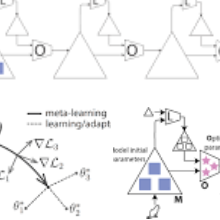Few-shot learning is a central problem in meta-learning, where learners must quickly adapt to new tasks given limited training data. Recently, feature pre-training has become a ubiquitous component in state-of-the-art meta-learning methods and is shown to provide significant performance improvement. However, there is limited theoretical understanding of the connection between pre-training and meta-learning. Further, pre-training requires global labels shared across tasks, which may be unavailable in practice. In this paper, we show why exploiting pre-training is theoretically advantageous for meta-learning, and in particular the critical role of global labels. This motivates us to propose Meta Label Learning (MeLa), a novel meta-learning framework that automatically infers global labels to obtains robust few-shot models. Empirically, we demonstrate that MeLa is competitive with existing methods and provide extensive ablation experiments to highlight its key properties.
翻译:少见的学习是元学习的一个中心问题,因为学习者必须迅速适应培训数据有限的新任务。最近,特色培训前已成为最新元学习方法中一个无处不在的组成部分,并表明能够显著改进业绩。然而,对预培训和元学习之间的联系的理论理解有限。此外,预培训要求全球在各种任务之间共同使用标签,而在实践中可能无法使用这些标签。在本文中,我们说明了为什么利用预培训在理论上对元学习有利,特别是全球标签的关键作用。这促使我们提出Meta Label Learning(MeLa)这个新的元学习框架,它自动推断出全球标签以获得强健的几发模型。我们很生动地证明,Mela与现有方法具有竞争力,并提供广泛的模拟实验,以突出其关键特性。




